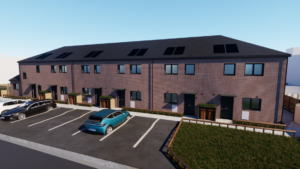Language, homes and logic. Part One.
In the first of two parts, Tony Hutchinson argues that the way we talk about housing is exacerbating the housing crisis.
Hardly a day goes by without the media commenting on the state of the housing market, usually bemoaning the lack of solutions which makes good headlines and simplistic soundbites.
Let’s break down the concept of a housing market and how language frames solutions. In classical economics, the market distributes scarce goods and resources to the best possible uses. The cumulative impact of everyone seeking their own best interest delivers the optimum outcome for all. In a market, everyone has the knowledge and ability to act in their own best interests.
Arguably, in terms of housing whether provided for sale or for rent, there are so many constraints on the knowledge of consumers and their ability to act in their own interests as to undermine that premise. Equally, housing is not a homogeneous good where products are interchangeable. Each property has a specific set of attributes, qualities and price: a 5-bedroom house in Chelsea is not the same as a 1-bedroom flat in Sunderland, or the other way around.
Persisting with this language drives an analysis that is simplistic and flawed. Trying to solve a problem that is seen in the terms of making a market work better misrepresents the depth and breadth of the factors to be considered.
Just looking at the supply side shows this clearly. There is a virtual oligopoly in the supply of new build housing for sale. Government policy is skewed towards doing the improbable, encouraging major housebuilders to increase the number of homes they build. With business models driven by very high levels of return on capital, there is no incentive to increase supply at the expense of margins.
Relaxation of planning controls, for example by allowing developers not to provide affordable homes or not enforcing design standards is not leading to more supply, rather it tends to encourage developers to pay more for land than they use, and their commercially confidential viability appraisals further reduce the provision of affordable homes.
If there is going to be a realistic, sustainable and holistic response to the shortage of homes across the country, the language of the market needs to change. The question needs to be framed in terms of how the country can secure the homes it needs which can provide a suitable and secure place to live and allow people to live in places where there are jobs. It is also important that homes do not create a long-term revenue burden whilst meeting environmental standards designed for the way we live now.
Following from this is an economic and industrial strategy that promotes investment in the skills and technologies that such an approach needs, using advanced manufacturing and engineering to innovate both products and construction processes. Equally, and possibly still more challenging, is increasing the supply of land, recognising that the value created by a planning consent is not just earned by the landowner and developer but also created by the local authority whose residents will be affected by the development. Capturing and recycling some of this value is part of an answer.
















